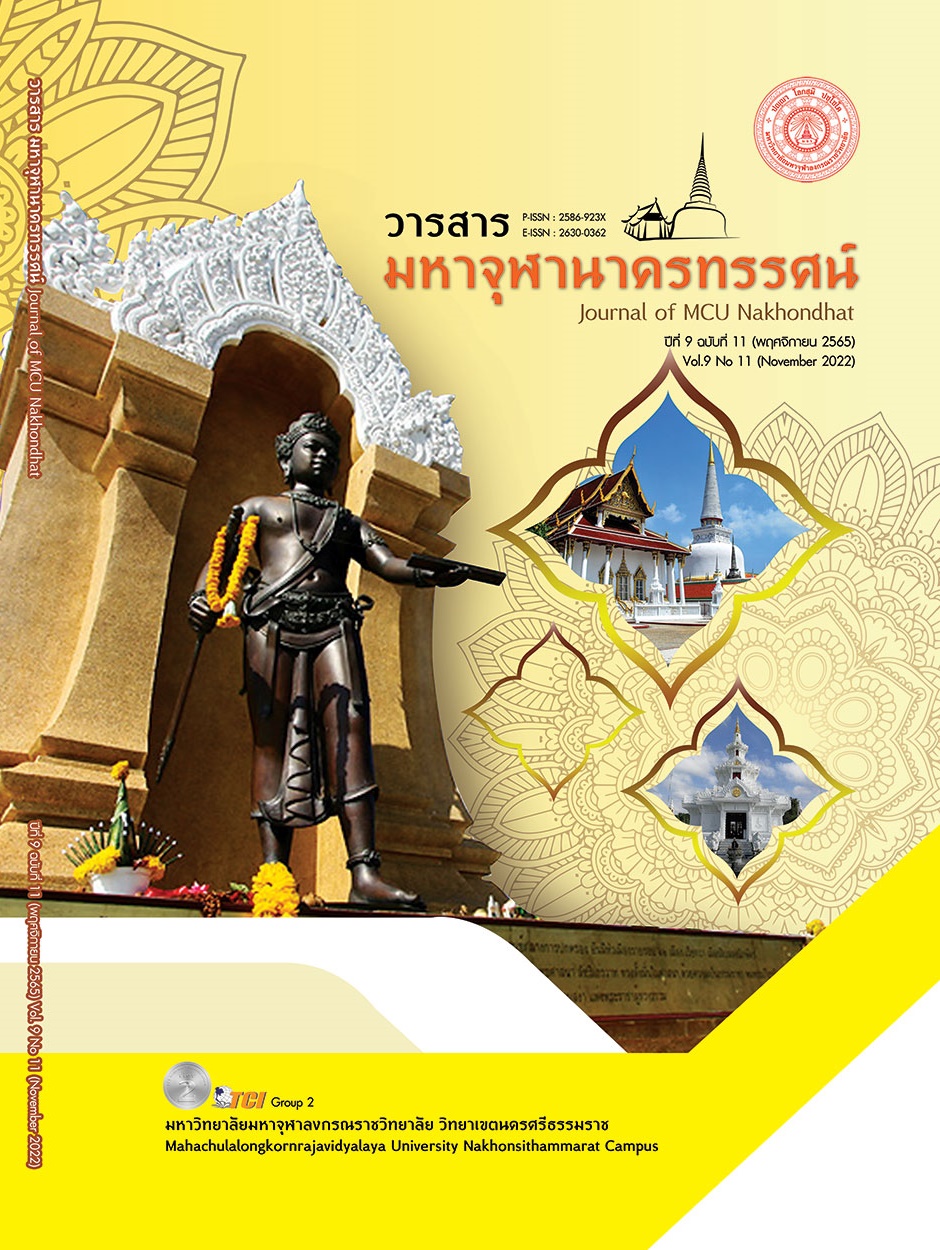A MODEL FOR DRIVING BUDDHIST SCHOOLS TOWARD SUCCESS NAKHON SI THAMMARAT PRIMARY EDUCATIONAL SERVICE AREA OFFICE 4
Main Article Content
Abstract
The Objectives of this research article were: 1) to investigate the current conditions and problems with driving Buddhist schools; 2) to develop a model for driving Buddhist schools toward success; and 3) to examine the propriety and feasibility of a model for diving Buddhist schools toward success Nakhon Si Thammarat Primary Educational Service Area Office 4. The study employed a mixed-method research. A sample group used for studying the current conditions and problems consisted of forty-five key informants who were from five Buddhist schools. Nine key informants from each school were chosen by way of purposive sampling. The data were collected via observation and interview. Descriptive statistics and percentages were used to examine the collected data. A focus group discussion with nine experts was also held to critically evaluate the propriety and feasibility of a model. The obtained data were analyzed by mean and standard deviation. From the study, the following results are found: 1) From investigating the current conditions and problems with driving Buddhist schools, it is found that schools aim at driving Buddhist schools via the use of Buddhist teachings and are founded on Buddhist school identity. Schools have kept their physical Buddhistness in active while developing continuously via a range of initiatives to foster sīla (morality), smādhi (concentration), and paññā (wisdom) in collaboration with the village, temples, and schools. The problems found were that most students still have not taken the Dhamma examination due to the Covid-19 situation. 2) From developing a model for driving Buddhist schools toward success, it is discovered that there are four stages based on Iddhipāda (the Four Paths of Accomplishment) which are: 2.1) Preparation based on Chanda (desire); 2.2) Operation based on Viriya (effort); 2.3) Evaluation based on Citta (thoughtfulness); and 2.4) Improvement and continual development based on Vīmaṃsā (Investigation). Trisikkhā (the Threefold Learning) is used in collaboration with villages, temples, and schools as well. And 3) After nine experts examined the propriety and feasibility of a model, the results showed the overall picture at the highest level ( = 4.61, S.D. = 0.49)
Article Details

This work is licensed under a Creative Commons Attribution-NonCommercial-NoDerivatives 4.0 International License.
References
กลุ่มนิเทศติดตามและประเมินผลการจัดการศึกษา. (2564). รายงานโครงการการส่งเสริมการจัดการศึกษาแนวพุทธด้วยการจัดการเรียนรู้แบบ Active Learning ปีงบประมาณ 2564. นครศรีธรรมราช: สำนักงานเขตพื้นที่การศึกษาประถมศึกษานครศรีธรรมราช เขต 4.
จเด็จ ทัศวงษา. (2560). การพัฒนารูปแบบการดำเนินงานโรงเรียนวิถีพุทธของสำนักงานเขตพื้นที่การศึกษาประถมศึกษามหาสารคาม เขต 3. ใน ดุษฎีนิพนธ์พุทธศาสตรดุษฎีบัณฑิต สาขาพุทธบริหารการศึกษา. มหาวิทยาลัยมหาจุฬาลงกรณราชวิทยาลัย.
บุญชม ศรีสะอาด และบุญส่ง นิลแก้ว. (2535). การอ้างอิงประชากรเมื่อใช้เครื่องมือแบบมาตราส่วนประมาณค่ากับกลุ่มตัวอย่าง. วารสารการวัดผลการศึกษา มศว มหาสารคาม, 3(1), 23-2.
พระณรงค์เดช อธิมุตฺโต (เดชาดิลก). (2560). รูปแบบการพัฒนาศูนย์การเรียนรู้โรงเรียนวิถีพุทธ. ใน ดุษฎีนิพนธ์พุทธศาสตรดุษฎีบัณฑิต สาขาพุทธบริหารการศึกษา. มหาวิทยาลัยมหาจุฬาลงกรณราชวิทยาลัย.
พระมหาศุภวัฒน์ สุขดำ. (2562). รูปแบบการบริหารโรงเรียนวิถีพุทธ จังหวัดสงขลา. วารสารมหาจุฬานาครทรรศน์, 6(6), 3188-3211.
พระมหาสุรศักดิ์ สุรสกฺโก (โพธิ์เงิน). (2557). ปัจจัยที่มีผลต่อการบริหาโรงเรียนวิถีพุทธชั้นนำของสถานศึกษาขั้นพื้นฐานสังกัดสำนักงานเขตพื้นที่การศึกษานนทบุรี. ใน ดุษฎีนิพนธ์พุทธศาสตรดุษฎีบัณฑิต สาขาพุทธบริหารการศึกษา. มหาวิทยาลัยมหาจุฬาลงกรณราชวิทยาลัย.
ระบบรายงานผลการประเมินส่วนราชการ. (2564). การประเมินตัวชี้วัดตามมาตรฐานการปรับปรุงประสิทธิภาพในการปฏิบัติราชการ. เรียกใช้เมื่อ 14 พฤษภาคม 2564 จาก https://krs.psdg-obec.go.th/indata_report2.php.
รัศมี พัฒนสระคู. (2556). โรงเรียนวิถีพุทธ : การพัฒนารูปแบบการบริหารงานพัฒนาคุณธรรมจริยธรรม นักเรียนในภาคอีสาน. ใน ดุษฎีนิพนธ์ปรัชญาดุษฎีบัณฑิต สาขาวิชาศิลปศาสตร์. มหาวิทยาลัยมหาสารคาม.
ราชกิจจานุเบกษา. (2560). รัฐธรรมนูญแห่งราชอาณาจักรไทย พุทธศักราช 2560. เรียกใช้เมื่อ 4 พฤษภาคม 2564 จาก https://www.ect.go.th/ect_th/ewt_dl_link.php?nid=2237
สถานศึกษาวิถีพุทธ. (2564). ข้อมูลสรุประดับคะแนนการประเมิน 29 ประการ. เรียกใช้เมื่อ 14 พฤษภาคม 2564 จาก https://www.vitheebuddha.com/main.php?ur l=resultdata
สำนักงานเขตพื้นที่การศึกษาประถมศึกษานครศรีธรรมราช เขต 4. (2564). แผนปฏิบัติการประจำปีงบประมาณ 2564. เรียกใช้เมื่อ 14 พฤษภาคม 2564 จาก https://www.pnst4.go.th.


